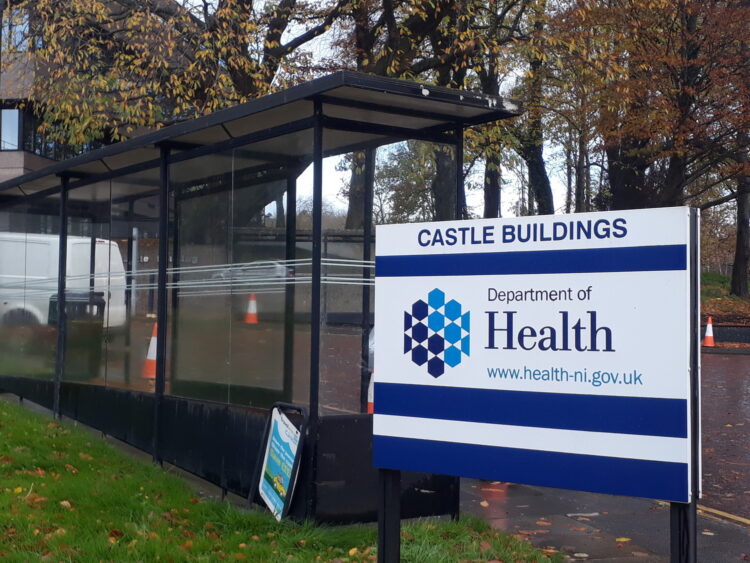By Tony O’Reilly-
The Department of Health in Northern Ireland has expressed serious concern ahead of a strike in light of the current pressures facing hospitals.
Nurses say the pay award imposed by the Department of Health last week has set nurses in Northern Ireland around 20% worse off in real terms compared with 10 years ago.
Six hundred military personnel from all three armed forces will start training to drive ambulances to cover for striking NHS workers across the UK.
A further 150 are being prepared to act as logistical support, defence sources said, with training for both groups to start “shortly”
It said it “fully understands the frustration and deep concern of staff across health and social care who have worked in extremely challenging circumstances over the last three years and continue to do so”.
It added: “In respect of the planned action by the RCN, intensive work is ongoing to mitigate the impact on patients.
“There has been constructive working between the RCN, the chief nursing officer and trust directors of nursing on patient safety issues, including derogations from strike action to maintain critical services.
“However, as the department previously stated, already fragile services will inevitably be further impaired by industrial action.”
Members of the Royal College of Nursing (RCN) from the region will take part in strikes along with colleagues in England and Wales on Thursday.
A second date is planned for next Tuesday in the industrial action over pay and conditions.
RCN Northern Ireland director Rita Devlin said: “It is with a heavy heart that many nurses will be standing on picket lines this morning instead of in hospital wards and in our community caring for patients.
“I am absolutely clear that no member of nursing staff wants to be in this position, but we have been left with no choice but to take action.”
A number of areas, including emergency departments, will be exempt from the RCN walk out.
The Western Health Trust has indicated that 587 outpatient appointments have been postponed, and eight inpatient and day-case procedures have been cancelled across its hospitals, as well as treatment rooms closed at 11 GP practices and reduced community nursing services.
The strike comes after health workers from three of Northern Ireland’s largest trade unions, Unison, Nipsa and GMB, took part in a 24-hour strike on Monday in the fight for better pay and conditions.
In a statement on the eve of the RCN strike, the Department of Health said it “fully understands the frustration and deep concern of staff across health and social care, who have worked in extremely challenging circumstances over the last three years and continue to do so”.
The department said intensive work is ongoing to mitigate the impact on patients where possible.
“There has been constructive partnership working between the RCN and the Chief Nursing Officer and HSC Trust Directors of Nursing on patient safety issues, including derogations from strike action to maintain critical services,” they said.
“However, as the department has previously stated, already fragile services will inevitably be further impaired by industrial action.”
The department voiced “particular concern” at the cumulative impact of repeated strike days, at a time when it described the health service as “facing what many regard as the most challenging winter in its history”.
“The industrial dispute is a national dispute which is only resolvable at national level. Northern Ireland has a policy of pay parity with England for nurses and other HSC workers covered by the Agenda for Change framework,” they said.
“The Department of Health remains extremely concerned at the scale of the current pressures on health and social care services – and the impact this is having on patients, service users, carers and staff.
“The challenges being faced here are mirrored in neighbouring jurisdictions.
“It is the reality that there are no quick or simple solutions.”
The department also described a serious mismatch between the demand for care and the current capacity of the system to meet it.
“That can only be fixed by sustained and long-term action to secure greater capacity,” it said.
The Western Health Trust has outlined some numbers around cancelled appointments.
It said 587 outpatients appointments and eight have been postponed across Altnagelvin Hospital, Omagh Treatment Centre and the South West Acute Hospital, while eight planned in patient and day case procedures at the same centres have been cancelled.
The South Eastern Health Trust said it has contingency plans in place, but warned that “significant disruption is anticipated” across all services.
“The trust will provide regular updates about the services which will be affected on our website and social media channels,” it said.
Loading
“The trust is working closely with the Royal College of Nursing in order to protect critical care.
“We apologise if any patients’ appointments have to be postponed. We will try and reschedule them as soon as possible
Six hundred military personnel from all three armed forces will start training to drive ambulances to cover for striking NHS workers across the UK later this month. A further 150 are being readied to act as logistical support, defence sources said, with training for both groups to start “shortly”.
After a meeting with the health secretary, Steve Barclay, the RCN’s general secretary, Pat Cullen, said there was no more on offer from the government and stressed the distress from the profession at being forced to strike.
“The government was true to its word – they would not talk to me about pay,” Cullen said. “I needed to come out of this meeting with something serious to show nurses why they should not strike this week. Regrettably, they are not getting an extra penny.
“Ministers had too little to say and I had to speak at length about the unprecedented strength of feeling in the profession. I expressed my deep disappointment at the belligerence – they have closed their books and walked away.”




